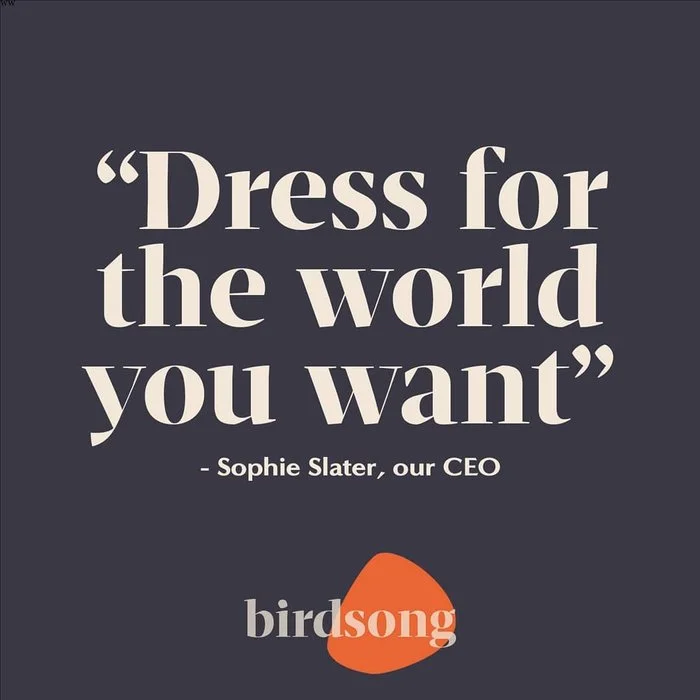The Titian Thread
The month in fashion, condensed.
Hi Hey there!,
Let's talk about Black Friday and its equally evil cousin, Cyber Monday (today!) — I have a lot of thoughts.
Nothing shows how much of an echo chamber the sustainable fashion world can be than a quick scroll through Pretty Little Thing's Twitter feed. On Friday, it was filled with delighted fans of the fast-fashion retailer sharing their "bargains" from PLT's 99% off Black Friday sale. "Just got 3 pairs of shoes & a dress for £1.55 🦄 💖 😭" was just one of many tweets that I found incredibly depressing.
Over the past few days, I've seen arguments for and against these sales. Fashion Revolution has called for a total boycott of Black Friday, with the environmental impact of overproduction at the heart of their campaign. For much of this year, clothing sat unsold in stores, so it's important for us to recognise how desperate big brands are to shift stock and make a quick buck. Buying into the sales essentially sends these brands the message that it's fine for them to continue operating business as usual because, for the right discount, we'll help them solve their overstock problem.
At the same time, I can't ignore the fact that many independent brands are relying on these sales to help keep their businesses afloat after a really tough retail year. Sustainably and ethically made clothing can often be more expensive than "normal" clothes, so if a Black Friday discount means you can now afford to support a small business that was previously out of your budget, surely that's a good thing?
The bigger discussion we should be having is about how we unlearn our deeply entrenched consumerism mindset, but that's a chat for another day, perhaps.
Whether you chose to shop the sales or not, ultimately it's how we treat our purchases that matter the most — only buying the things we know we'll use for a long time, repairing them when they break and disposing of them thoughtfully when the time comes.
Got questions or comments? Hit reply to this email to get in touch!
Meg x
Stories I Wrote
The Eco-Educators Redefining What It Means To Be An ‘Influencer’ for Eco-Age. Have you noticed the rise of a new generation of IG accounts, influencing through education rather than centring themselves in their content? I sure have. Everyone from environmental activists to university students are creating brightly coloured, bite-sized infographics to help unpack the industry’s biggest issues, redefining what it means to be an “influencer” along the way. I spoke to five eco-educators about their work.
Inside the Jewellery Industry's Sustainability Sea Change for The Forward Lab. I loved writing this story! It's not often that I get to write positive pieces, it's mostly death and destruction these days. Learning all about the small brands, precious stone traders and innovative companies transforming the jewellery industry was a real joy. Did you know that in theory, gold, silver and platinum can be recycled an infinite amount of times?
Is it More Sustainable to Shop Online Or in the Store? for EcoCult. This was a really difficult story to write. There are so many variables to factor into this equation so it's impossible to give a straight answer — everything from whether you drive or take public transport to the shops, to whether you're prone to returning online purchases — will impact how eco-friendly it is.
Stories I didn’t write
Higg Says Natural Fibers Are Worse for the Environment than Synthetics. Is That True? by Alden Wicker for EcoCult. Wicker breaks down the data to understand how the Higg Index, which is a widely used sustainability platform in the industry, came to this surprising conclusion.
Can We Stop Greenwashing? by Elizabeth Cline for Patagonia. The explosive interest in sustainable fashion has ironically led to more greenwashing than ever, reports Cline.
Offsetting Pivots from Carbon to Plastic by Rachel Cernansky for Vogue Business. On average, we throw out 10 kgs of plastic per month. Now, you can pay for an US$8 subscription with Plastic Neutral to offset your plastic consumption. Would you sign up?
The Ethics Of Resale: Recognizing Privilege In The Second-hand Market by Julie Kuenneke for Remake. Buying second hand is all the rage, but it's important to recognise the impact that the sudden popularity of charity shopping has on the communities who rely on these stores.
The Pandemic Transformed Fashion's Sustainability Narrative In 2020 by Whitney Bauck for Fashionista. COVID-19 caused major setbacks in the sustainable fashion world, which until 2020 was on a pretty good trajectory. Bauck looks into what this means for 2021 and beyond.
“Kindness Is Power”: Marcus Rashford Joins Forces With Burberry On A Game-Changing Charity Initiative by Julia Hobbs for Vogue. God bless Marcus Rashford, the footballer turned activist who has partnered with Burberry in November to support youth charities in the UK.
How to Recycle Unwanted Clothes: Myths, Realities, and Practical Tips by Diana Bunge for Good On You. It's so hard to how to recycle clothing, but Good on You has some great advice for where to dispose of your unwanted garments.
Remake's 2020 Transparency Report by the Remake team. Some of the brands listed by Remake as "Offenders" in this report surprised me — Allbirds and Everlane are two that are generally considered pretty sustainable. An interesting, concise report!
Five Things Fashion History Can Teach Us About Clothing Longevity by Niamh Tuft for Fashion Revolution. Did you know, in the 17th and 18th centuries, a common way of recycling clothing was to turn rags into paper? Love this brief fashion history lesson by Niamh Tuft.
H&M’s Green Machine: A Recycling Solution? by Jasmin Malik Chua for Vogue Business. Malik Chua's piece on H&M's recycling machine asks whether this is just another greenwashing marketing ploy or an innovation primed for industry-wide application.
“To Me, Sustainable Fashion Means Celebrating The Clothes That We Already Own In A Bid To Show Love And Respect To The People Who Made Them” by Harriet Davey for Stylist. A lovely conversation with fair fashion campaigner and influencer Venetia La Manna.
The To-Do List
BooWho.org is a cleverly designed petition, disguised as fast fashion brand Boohoo's website. BooWho is demanding fair wages for Boohoo's garment workers, who earn £3.50/hour. Despite TONNES of bad press about working conditions in their Leicester factories, the brand made £68.1m in profits in the six months of 2020. Boohoo workers deserve better.
The Remake team have just launched a handy directory to help you check whether your favourite brands are "Rockstars", "Up & Comers", "Wannabees" or "Offenders". Remake has evaluated brands based on their publicly available sustainability information, with surprising results.
Can capitalism and ethical fashion ever coincide? This Common Threads podcast episode meets journalist Tansy Hoskins, who is the author of Stitched Up: The Anticapitalist Book of Fashion. This is a really interesting conversation to tune into, especially in the lead up to Christmas.
I'm a big fan of London born and made brand BirdSong, especially because they rejected this year's Black Friday in favour of Transparent Friday. They've been breaking down the costs involved with making their clothing to help their customers understand their pricing structure compared to high street brands.






